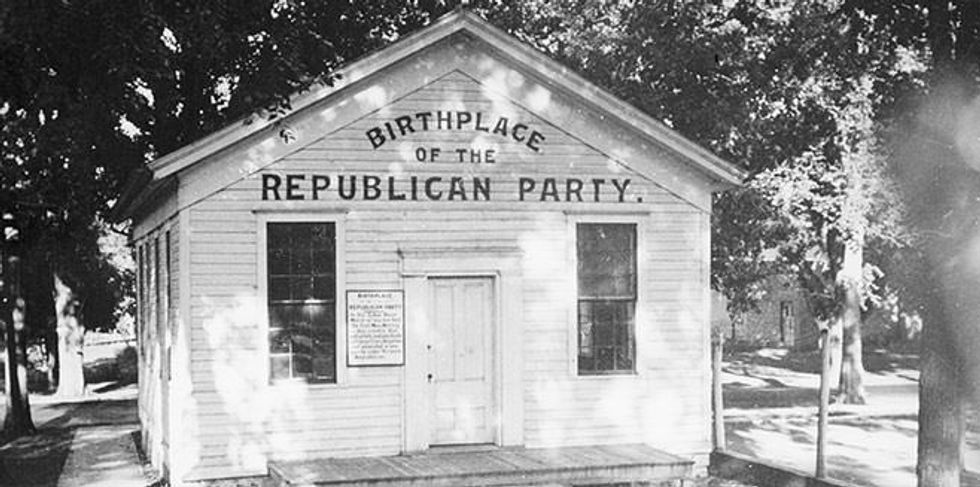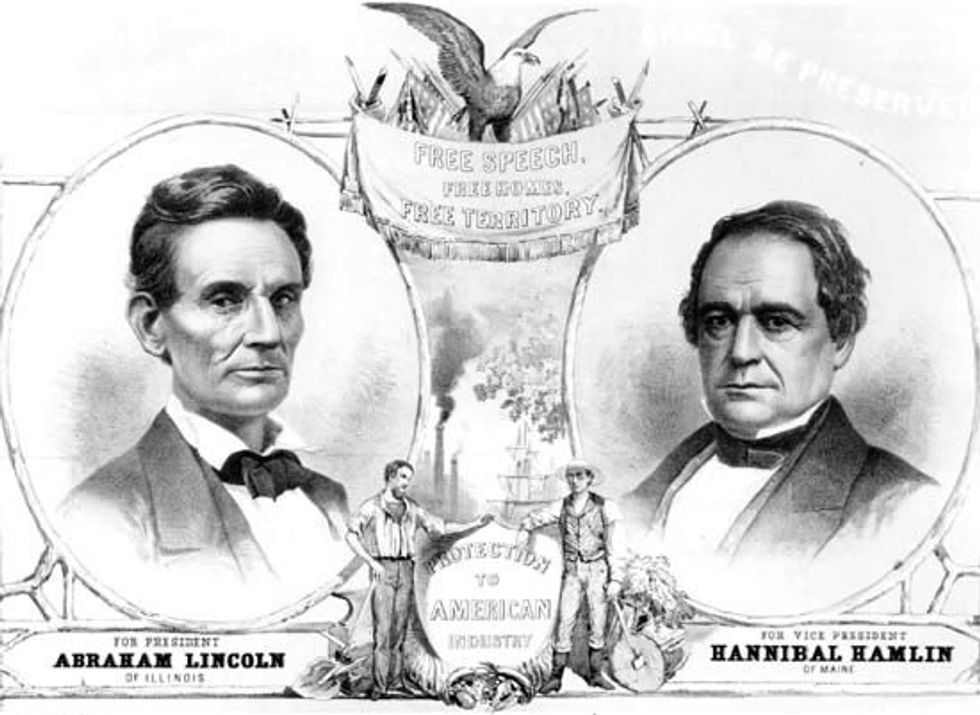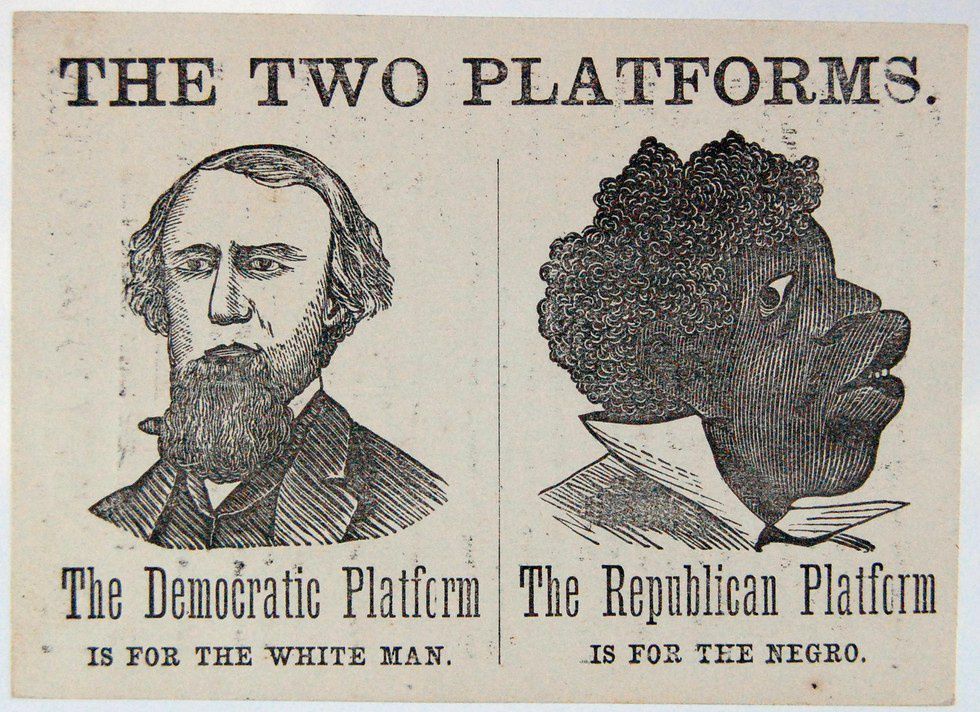Today's Republican Party strongly opposes the idea of big government. A culturally conservative party, it's demographic support is strongest among white voters and the Southern states. The GOP's 2016 presidential nominee, Donald J. Trump, has been heavily criticized in the past few months for inciting racial and sexual tensions. However, the Republican Party of the United States has not always been this way. Over the past 162 years since its founding, the party has undergone a complete transformation from the anti-slavery party of Abraham Lincoln to the anti-immigration party of Donald Trump. To understand how the GOP has become what it is today, we have to go back to March of 1854, just seven years before the start of the monumental American Civil War.
At the time in the United States, two parties dominated the federal government. The Whig Party and the Democratic Party. As the nation began to quickly expand it's territory westward, intense debates were sparked over whether the newly founded states should permit slavery or not.The Democratic Party, with strong support coming from the Southern states, held a pro-slavery stance. Meanwhile, the Whig Party was divided on the issue at hand. Whig-supporters in the North worried that the growing number of slaves could hurt free Caucasian workers economically. In 1854, Whigs and Democrats began to debate on whether the territories of Nebraska and Kansas should permit slavery or not. Unable to agree on an ultimatum to fight for, the Whig Party ended up collapsing that very year. The former Whigs from the North formed a new political party, called the Republican Party, to fight against the further expansion of slavery.
By around 1860, the newly-founded Republican Party became increasingly powerful in the North. As a result, a little-known Republican from Kentucky named Abraham Lincoln ended up winning the Presidential election of 1860 to become the 16th President of the United States.
Despite Lincoln's promise not to interfere with slavery in the states that have already instituted it, he and his party were still far too anti-slavery for the Southern Democratic states to tolerate. So in April of 1861, 11 southern states seceded from the Union to form the Confederate State of America. The Northern states decided to fight to keep the Union together, thus resulting in the Civil War. The result of the war was a Northern victory, the reunification of the Untied States, and the abolition of slavery nationwide.
Following the war's end in 1865, Republicans began to fight to ensure that recently freed slaves in the South had their rights respected and accepted. A year after the assassination of President Abraham Lincoln by John Wilkes Booth, the Republican Party passed the Civil Rights Act of 1866, which stated that black citizens had the same rights as white citizens. The party fought to ensure that black men had the right to vote in regards to new laws and constitutional amendments.
However, something that happened during the Civil War began changing the young Republican Party to what it is today. Many northern businessmen became very rich thanks to government spending during the war. Over time, these wealthy industrialists and financiers began taking more and more leading roles within the party. Wanting to hold on to positions of power in the government, they begin to think that fighting for black rights in a mostly white nation wasn't quite the best way to do so.
Meanwhile in the South, white Democrats were resisting these new racial reforms, often violently with groups such as the Ku Klux Klan.The white Republican leaders, feeling that they had done enough for the blacks by now and that the party should emphasize on other issues at hand, finally gave up their attempts to reform the south in 1870.
By the 1920s, the Republican Party of the United States had become the party of big business. While this worked out well when the economy was doing well, the Great Depression of 1929 led to the drop of the Republicans from power and the rise of Franklin D. Roosevelt and the Democratic Party. The newly installed Democratic Party leaders immediately began to enlarge the size and role of the federal government in order to to fight the Depression and better provide for the American citizens. The Republicans opposed this rapid expansion, declaring themselves as the "opposition to big government," a title that the GOP continues to identify themselves by today.
Going into the 1950s and '60s, race and segregation in the South returned to the forefront of national politics. The Civil Rights Movement, led by individuals such as Rosa Parks and Dr. Martin Luther King Jr., attempted to end segregation once and for all and truly ensure that the black people were treated as equals to the whites in each and every way. Then, in 1964, Democratic President Lyndon B. Johnson signed the Civil Rights Act into law. In response, Republican Presidential nominee Barry Goldwater opposed it, arguing that the law expanded government power too much. At this critical point in U.S. political history, Black voters who had once been supporters of the Republican Party almost entirely switched over and began to support their new advocates in the government -- the Democratic Party. White voters from the South, who had been hardcore Democrats in the past, and had began to resent the "big government interference" in the areas of race, abortion rights and school prayer began supporting the Republican Party they had once opposed so strongly.
By the 1980s, the Republican Party of the United States began to look nearly identical to the GOP we know of today. With the start of the major demographic shift of Hispanic immigration in both legal and illegal forms in the 21st century, the Democratic Party took a pro-immigration stance while the Republican Party took an anti-immigration stance on the matter. The consequences of the GOP's stance became clear during the 2012 presidential election when Republican Mitt Romney lost to Democrat Barack Obama due to the lack of Hispanic voters, approximately 20 percent to 80 percent.
Beginning to look like a political party for white voters in an increasingly non-white country, the Republican Party began to fear that their stance on immigration might prevent them from winning the presidency ever again. In 2013, Senators Marco Rubio and John McCain suggested that the party collaborate with the Democrats on an immigration reform bill that would give unauthorized illegal citizens a path to a legal status. However, the suggestion was met with a huge backlash from the party's predominantly white base, which viewed the suggested bill as amnesty for law breakers. This backlash resulted in the Republican voters' mistrust for their representatives, leading to the perfect opportunity for a radical anti-immigration businessman like Donald J. Trump to become the Republican Party's nominee for the 2016 presidential election. Thus, in the span of 162 years, the Republican Party that had once fought for equality came to be the party that is now fighting to oppress.
























